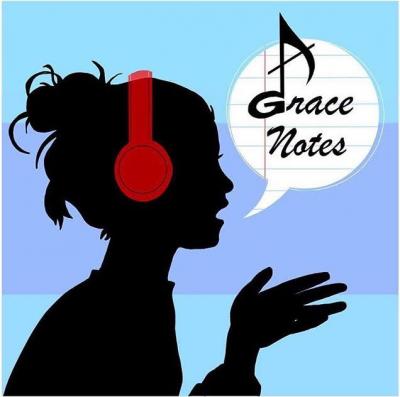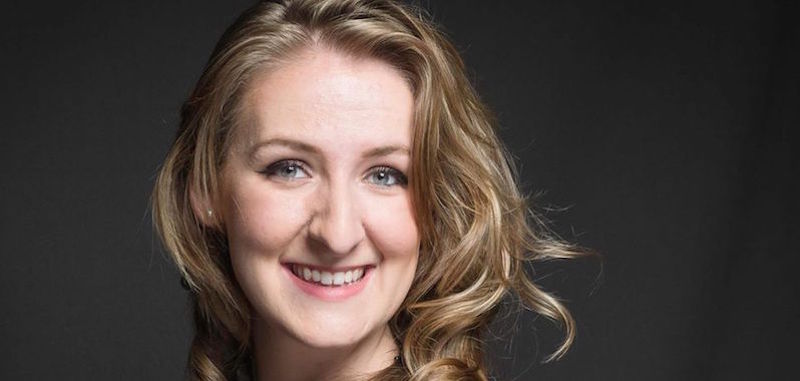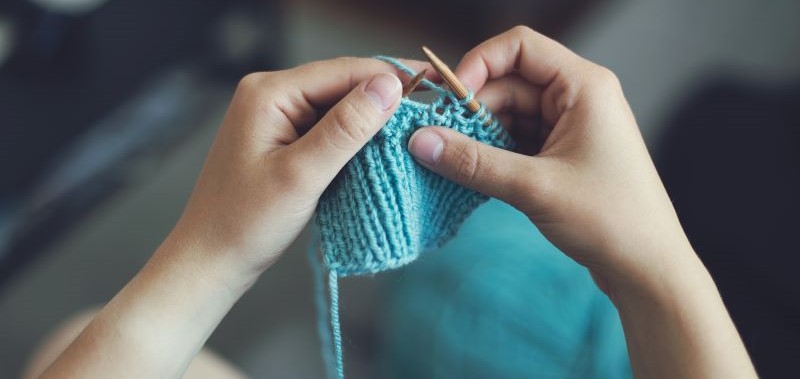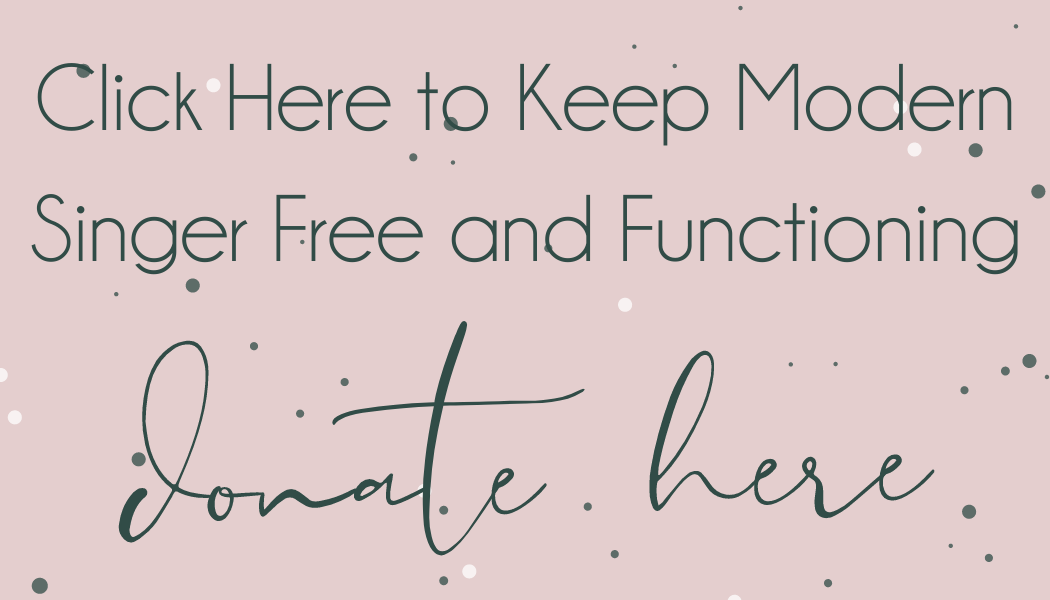Grace Notes Podcast: A Modern Approach to the Classics
Portland-based soprano Grace Weaver is the host of the bi-weekly podcast Grace Notes. What is unique about Weaver's podcast is the discussion of social issues in opera through plot and enthusiasm. Like Modern Singer, Weaver focuses on a modern approach to a classic art form. I got a chance to sit down and chat with the podcasting diva about music, politics, and feminism and how that ties in to her inspiration for Grace Notes.
Who is Grace Weaver?
The origins of Grace Notes
My dear friend, Ben Hamlin, runs an entertainment network called Infinity Break. For most of our friendship, he has worked with various folks on producing podcasts on topics that cover the entire gambit. Infinity Break collaborates with people and their personal interests to produce great content. It gets people to share about the topics they care about the most. He approached me about starting a podcast after many late nights of me rapidly firing off about the most recent opera I’d seen, topics from my music history class, race in regards to opera performance and production, and so much more! Surprisingly, it took some convincing on his part. I was hesitant to commit to a show as a student double majoring with a part-time job. But now it’s a great way to escape from the world of my day job and dive into something I find truly interesting.

How does Infinity Break champion opera?
Working with Infinity Break is an absolute pleasure! 'Telling stories our own way' is an integral part of the mission, and I think it truly resonates with how I approach the show. My musical background and my passion for rhetoric and social issues influences my entire approach to music performance and my podcast, which I think gives me a unique perspective on an art form that is cherished by so many. That is true of Infinity Break's other content, too - there are a lot of passionate people seeking to share with others. It's not that different from musicians who are passionate about their craft and eager to share!
The topics you discuss in your podcast are history based in opera, but you use a modern application. What inspires you?
My goal is to show how an art form that is traditionally seen as archaic is still relevant and will remain so. There have been many times for me, on a personal level, a piece has come into my life at exactly the right time and given me insight into my own situation—usually an aria or a scene. But I believe these works can accomplish this on a larger scale. One of my more recent episodes covered a production of La Bohème. On the surface, it is a tragic encounter of two young lovers meddling their way through the trials and tribulations of most relationships, but it also involves poverty. That is where the relevance on a larger scale is hidden! Most folks have had struggles in their romantic pursuits, and this is where Puccini can relate to the listener personally. This is where it can feel like he knows YOUR story and YOUR struggles because he captures those moments of passion and tension with such accuracy and intimacy. But it becomes OUR story with the theme of poverty that is periodically tapped throughout the first three acts and comes swinging down at the end with Mimi’s death—and arguably before that when Rodolfo ends things with her so she can date someone who can afford to pay for her healthcare. I don’t think anyone can argue this story isn’t relatable to our nation’s situation.
How do you use these social issues to relate to opera in your podcast? What is your motivation?
My motivation is kind of two pronged — so many operas talk about the issues we face today. A lot of social issues are LONG held traditions that benefited and continue to benefit groups in power. By pointing out these trends I think it can lend a different perspective on the issues. In fact, most opera stems from a political place. In the Baroque era, opera was used to uphold the norm that 'our rulers and heroes are good.' From the Classical era onward, it became more critical to tell stories about humanity rather than the nation or its powerful figurehead. Ignoring that, context strips meaning and purpose from the art, and though it’s still enjoyable, it is incomplete. The other part of my motivation is to be critical of the art form. Opera is an old art form, with most of the repertoire, and even more of the frequently performed works, being championed by old white men who were commissioned by old white richer men and their families. So in regards to how it treats POC, women, and LGTBTQ+ is problematic in both production and in the libretto.
As lovers of opera, it would irresponsible to deny this facet of the art form—opera can be sexist, racist, heteronormative, perpetuate rape culture, and so much more. I think it should be handled the way a lot of people approach the use of slurs in literature—it is part of the work and to erase it would also be wrong, so instead use it as an opportunity to unpack these issues. In addition to pointing out the less accepting sides of opera, I think it is also important to point out who is doing new innovative things to make opera more inclusive. NPR just did a great interview with Opera Creole in New Orleans about their mission to bring attention to opera that was either blatantly subdued or never got its due attention because of the race of the composers.
Opera is know for being "inaccessible" and "stuffy" to outside audiences. How can Grace Notes change that?
This one is tough. I would like to make it easier for people to learn about opera and make it a bit less intimidating. Intimidating is a more accurate adjective, and I think that’s what people mean when they describe it as 'stuffy and inaccessible.' I can’t exactly disagree either. If you tell someone who isn’t a classical music fan they should go sit through three hours of music that is complex, in another language, and to appreciate the poetry and cultural context, all while feeling comfortable is definitely intimidating—culture of opera attendance aside. It doesn’t help that sometimes opera and opera fans make it inaccessible by looking down their noses at other genres of music. I would like to help demystify it by giving people something to relate to, and I am choosing to do that by relating it to social issues and talking about where it comes from. I also try to keep my language acutely academic, but refuse to shy away from fangirling and enthusiasm! I LOVE seeing memes about opera that bring text or jokes into current language. Opera is kind of like Shakespeare in that if you can get past the flowery language, it can be really irreverent and funny!

Who is your target audience and why?
While I would love to think that everyone and their mother is interested in opera, that currently is not the case. My target audience ranges from those who are already music lovers who want new takes on old favorites to those who have a budding interest in music. I try really hard to keep my episodes accessible to those who weren’t exposed to years of music theory and vocal pedagogy for that reason. While I know most of the audience has some musical background, I’d love to expose people to an art form from one of their earlier encounters.
Why do you think people are drawn to podcasts?
Personally, I like podcasts because they’re 30-90 minutes of focused discussion on a central idea or theme. It is much like an article, but I can listen to it, so it can travel with me while I commute, while I work, or on a walk. It is highly versatile and it is so easy to get immersed! I am totally guilty of just binge listening to entire logs of episodes on a topic, and anxiously awaiting the next installment.
What are your goals for Grace Notes?
I would really like to collaborate with other music podcasts and interview people in the music community—Portland has many ensembles for both music and instrumental performance, so I’m pretty fortunate to be living in a place where great performances are only 15 minutes away.
Is opera a dying art form?
Personally, I think this idea is perpetuated by two groups: people who aren’t related to the classical music community and those in the community who are resistant to change. Just like any other art form from the 16th century, it is changing just as it has since its creation. I don’t quite want to call it a stigma, but the general population seems to have a preconceived notion about what classical music is. Now with older and more recent cuts to arts funding, donations and ticket sales are more important than ever. Building a reliable and loyal patronage is difficult, but we see companies of all sizes reaching out to audiences. From my experience, I can only talk about opera houses near me –Seattle Opera and Portland Opera. Those two houses have both started ticket programs targeting viewers between the ages of 21-39 by offering discounts on individual and/or season ticket sales as well as meetups before the show often with complimentary beverages.I am a member of the Portland Opera’s Young Patron Society, and I get to enjoy some of the best seats in the house for $25 with free wine at intermission.
There’s also the rising trend of pop-up opera or bringing opera to new places. Whether that is a program like Opera on Tap, which is a nationwide company that performs opera in bars, or opera carts that travel to parks and do abridged performances. There are also festivals that celebrate newly composed works like the Prototype Festival in New York.
RAPID FIRE:
Tell me your favorite opera pun.
Credit for this goes to my friend, Mason Cooper: What does Violetta order for dinner at Olive Garden? PASTA, Alfredo.
If you could be a different voice part, regardless of gender, what would you be?
Tenor di Grazia hands down - like Lawrence Brownlee!
What is your musical guilty pleasure?
Legally Blonde the musical. I have only ever loved that story and that score.
In three words, describe Grace Notes.
Political opera screaming.
Favorite kind of wine?
Deep full bodied reds! Malbec, Syrah, Merlot, and also a nice Zinfandel.
If you want to get in contact with Grace Weaver, you can find her at Infinitybreak.net under the Grace Notes tab, Twitter: @Mayzinegrace, and for Grace Notes updates and related topics: @GNotesPodcast.








